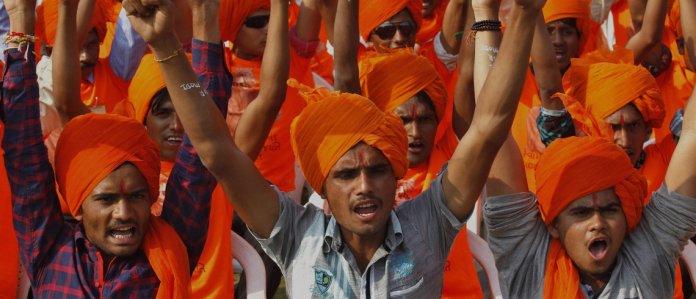Draconian anti-conversion laws in India have led to the arrests of hundreds of Christians, according to church sources.
UK-based Release International, which raises the voice of persecuted Christians worldwide, warns: ‘The persecution of Christians and other religious minorities in India increases dramatically with each passing month.’
400 arrested
Twelve of India’s 28 states have now passed anti-conversion laws, and momentum is building to impose a national law across the whole of India. This would limit the freedom of religious minorities, including Christians, Muslims, Buddhists, and Sikhs, from sharing their faith.
Police are arresting Christians under a law that is intended to prevent conversion by force, but in practise prevents any Christians from sharing their faith – even though their right to do so is enshrined in the Indian constitution.
UCA news report that nearly 400 Christians have been arrested in the state of Uttar Pradesh since the law was passed three years ago. They say most of the 398 Christians arrested are Protestant pastors and church members.
According to the Indian press, police brought in 42 Christians for questioning in Uttar Pradesh at the end of November. Twenty-seven pastors were among those interrogated. Nine were formally arrested. Police also confiscated large amounts of religious books and laptops.
‘Terrorised’
‘Pastors have been arrested under false allegations,’ says Release International CEO Paul Robinson. ‘We’ve had reports from witnesses of women and children being terrorised as they returned home from their church meetings. In the worst cases, pastors have been beaten up and a few have been killed.’
Uttar Pradesh is India’s most populous state. It has long been a hotbed of ‘Hindutva’ – ‘Hindu-ness’ – which is championed by extreme Hindu nationalists who claim that to be Indian is to be Hindu. Observers warn that Hindutva religious nationalism is on the rise across the country.
India is set to hold national elections in 2024, raising the possibility of further gains for the Hindu nationalist BJP.
‘Given the prevailing trend, the persecution of Christians in India is likely to increase,’ warns Release International CEO Paul Robinson. ‘Year upon year, our partners are reporting a rise in the persecution of Christians in India.’
‘This erupted into full-scale rioting in May in Manipur, where ethnic and religious violence came together to create a perfect storm. Indian media estimate 175 were killed. Our sources tell us that around 300 churches were burned down, and 60,000 were driven from their homes.
‘Repeal these laws’
‘We are witnessing the world’s largest democracy becoming an increasingly intolerant society,’ says Paul Robinson. ‘Release International calls on the Indian government to act swiftly to prevent the spread of this culture of hostility towards minority faiths, and to overturn the anti-conversion laws.’
India’s anti-conversion laws are intended to ban conversion by force or by fraud. But legislation is vaguely worded and is being applied to relief aid, prayer meetings and any form of evangelism – even though freedom of religion is guaranteed under the Indian constitution.
Anyone wishing to change their faith must first register with the authorities, which can lead to pressure to remain a Hindu. Official surveys of the Christian community elicit information that could leave Christians vulnerable to further discrimination and attack.
The influential United States Commission on International Religious Freedom has also called for the anti-conversion laws to be repealed.
They warn: ‘The anti-conversion laws… enable and embolden existing government harassment, vigilante violence, and discrimination against religious minorities, as well as crackdowns on civil society organisations.’
USCIRF is calling for the US to designate India a country of particular concern.
Underclass
One explanation for the rise of religious hostility may be the increasing numbers of India’s underclass, the Dalits, who are becoming Christians. These are the poorest of the poor who perform the most menial jobs in society. Many are regarded – and taught to regard themselves – as less than human.
Paul Robinson says the decision of many Dalits to reject Hinduism and shrug off their menial status in society poses a direct threat to those in positions of power.
Christian leaders say it is becoming increasingly difficult for the Church in India to work openly or to meet in public. Some believe Christians may have to return to methods adopted by the early Church to survive persecution, reverting to the low-profile, localised house churches of the 1st century.
Appeal to help
Release International has launched an appeal to help Christians in India and elsewhere who are being oppressed for their faith. For more details of the RI appeal to help persecuted Christians, go to: https://releaseinternational.org/campaign/thumleima/
RI is active in some 30 countries. It works through partners to prayerfully, pastorally, and practically support the families of Christian martyrs, prisoners of faith and their families. It also supports Christians suffering oppression and violence, and those forced to flee.










